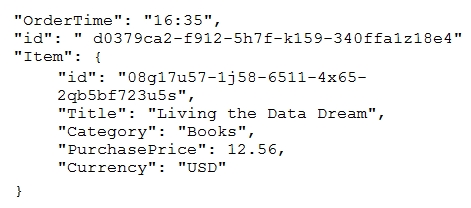

Your company is an online retailer that can have more than 100 million orders during a 24-hour period, 95 percent of which are placed between 16:30 and 17:00.
All the orders are in US dollars. The current product line contains the following three item categories:
✑ Games with 15,123 items
✑ Books with 35,312 items
✑ Pens with 6,234 items
You are designing an Azure Cosmos DB data solution for a collection named Orders Collection. The following documents is a typical order in Orders Collection.
Orders Collection is expected to have a balanced read/write-intensive workload.
Which partition key provides the most efficient throughput?
kempstonjoystick
Highly Voted 5 years, 2 months agoTaddi10
4 years, 10 months agoMamadouNiang
Highly Voted 5 years, 1 month agoTreadmill
4 years, 10 months agoIAMKPR
Most Recent 4 years agoMMM777
4 years agodavita8
4 years, 1 month agoDeepu1987
4 years, 3 months agoBobFar
4 years agoTaherAli2020
4 years, 3 months agocadio30
4 years agotejasjoshi
3 years, 11 months agosturcu
4 years, 3 months agoTkSQL
4 years, 1 month agosyu31svc
4 years, 6 months agobrcdbrcd
4 years, 6 months agolingjun
4 years, 6 months agolingjun
4 years, 6 months agoM0e
4 years, 7 months agomonumentalcrankiness
4 years, 7 months agoShivam131
4 years, 8 months agoAsh666
4 years, 10 months agoYaswant
4 years, 10 months agokrisspark
4 years, 10 months agoLeonLeon
4 years, 11 months agoSudipta3009
4 years, 10 months agoBHAWS
4 years, 12 months ago